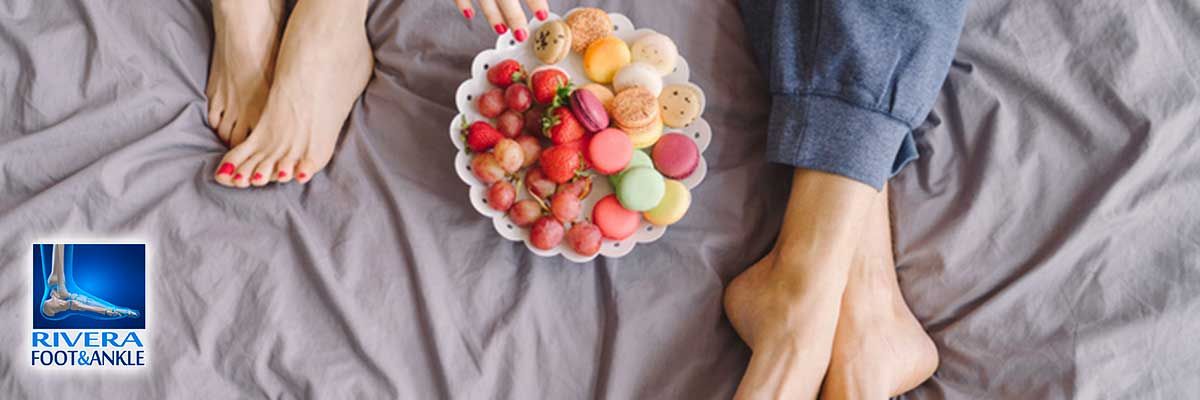
How to Eat Right for Your Foot Health
Foot and Ankle Specialists
Osteoporosis is a disease of progressive bone loss associated with an increased risk of fractures. It literally means "porous bone." The disease often develops unnoticed over many years, with no symptoms or discomfort, until a fracture occurs.
One of the first places one may see the effects of osteoporosis is in the feet. A stress fracture in the foot is often the first sign. There are several things you can do throughout your life to prevent osteoporosis, slow its progression, and protect yourself from fractures.
Include adequate amounts of calcium and vitamin D in your diet.
During the growing years, your body needs calcium to build strong bones and to create a supply of calcium reserves. Building bone mass when you are young is a good investment for your future. Inadequate calcium during growth can contribute to the development of osteoporosis later in life.
Whatever your age or health status, you need calcium to keep your bones healthy. Calcium continues to be an essential nutrient after growth because the body loses calcium every day. Although calcium can't prevent gradual bone loss after menopause, it continues to play an essential role in maintaining bone quality. Even if you've gone through menopause or already have osteoporosis, increasing your intake of calcium and vitamin D can decrease your risk of fracture.
How much calcium you need will vary depending on your age and other factors. The National Academy of Sciences makes the following recommendations regarding daily intake of calcium:
- Males and females 9 to 18 years: 1,300 mg per day
- Women and men 19 to 50 years: 1,000 mg per day
- Pregnant or nursing women up to age 18: 1,300 mg per day
- Pregnant or nursing women 19 to 50 years: 1,000 mg per day
- Women and men over 50: 1,200 mg per day
Dairy products, including yogurt and cheese, are excellent sources of calcium. An eight-ounce glass of milk contains about 300 mg of calcium. Other calcium-rich foods include sardines with bones and green leafy vegetables, including broccoli and collard greens. Dietary supplements can help because it is difficult to consume adequate amounts from food alone. Talk to your doctor before taking a calcium supplement.
Vitamin D helps your body absorb calcium. The recommendation for vitamin D is 400 IU to 1,000 IU daily. Supplemented dairy products are an excellent source of vitamin D; a cup of milk contains 100 IU. Vitamin supplements can be taken if your diet doesn't contain enough of this nutrient. Again, consult with your doctor before taking a supplement. Too much vitamin D (greater than 2,000 IU daily) can be toxic.
Source: aofas
RIVERA FOOT & ANKLE: At Orlando H.Rivera DPM, our priority is to deliver quality care to informed patients in a comfortable and convenient setting. When you have problems with your feet, you need to turn to a podiatrist who listens and responds… an experienced doctor who knows the field and can effectively diagnose and treat your needs… a friendly physician who counsels you on the best ways to maintain and improve your health. Our physician(s) meet all these criteria. Plus, you benefit from a dedicated team of trained professionals who give you the individualized attention you deserve.

Houston Foot and Ankle Podiatry
Foot and Ankle, Dr. Orlando Rivera, Advanced Foot & Ankle Specialist, Foot and Ankle Podiatry, Houston Foot & Ankle Surgical, Treatment of Foot and Ankle, Foot & ankle specialists, Podiatrist in houston, podiatrist in houston, Orlando H.Rivera DPM, Houston Foot Doctor, Foot and Ankle Surgeon Houston, Ankle and Foot Specialist Houston, Podiatrist Houston, Foot Pain Houston.



